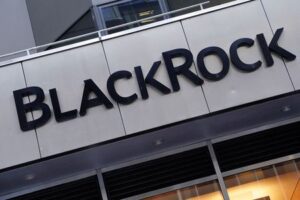A look at the day ahead in U.S. and global markets from Mike Dolan
World stock indexes have shaken off a month of doubts to come back within 0.5% of record highs on signs of a loosening U.S. labor market, falling European interest rates and another Hong Kong surge.
Wall Street’s wobble appears to be over, with the S&P 500 jumping on Thursday to its highest close since April 1 on an unexpected jump in weekly jobless claims that re-stoked Federal Reserve easing expectations. And futures extended those gains ahead of Friday’s bell.
The returning calm was evident in subsiding volatility gauges, with the VIX ‘fear index’ closing on Thursday at its lowest since January and the MOVE index of Treasury volatility ebbing to near 6-week lows too.
With Fed futures now 90% priced for a quarter-point U.S. interest rate cut by September and a decent 30-year Treasury auction completing a heavy week of new debt sales without much trouble, Treasury yields edged lower.
San Francisco Fed chief Mary Daly on Thursday claimed she was still in “wait-and-see mode” but added: “We’ve had three stubborn months of data, but I still see monetary policy is working … I do think that we’re seeing, in a really positive way, disinflation.”
The global picture was also lifted by Thursday’s indication from the Bank of England that its policymakers were shifting tack to join the European Central Bank in a likely first rate cut as soon as next month – adding to cuts already seen in Switzerland and Sweden this year.
With money markets now seeing a 50-50 chance of a June BoE move, 10-year British government bond yields fell to their lowest level in a month on Friday.
Encouraging for both the ECB and BoE is the fact that diverging from the Fed trajectory has not significantly weakened either the euro or sterling in the process.
Minutes from the ECB’s most recent meeting will be watched closely later today.
The pan-European STOXX 600 climbed almost 1% on Friday to an all-time high, with Germany’s benchmark also touching a new record.
The macro picture is far from crystal clear, however.
Data released on Friday showed Britain’s first-quarter economic growth bounced back stronger than many had expected and the Atlanta Fed’s closely-watched U.S. real-time GDP estimate is tracking growth back above 4% – despite economic surprise indexes at their most negative in more than a year.
But if disinflation does resume, the punchy growth signals and above-forecast first-quarter earnings season may well provide the perfect backdrop for stock markets. The critical U.S. consumer price inflation report is due next week.
Elsewhere, Asia bourses were also buoyed by the global picture. Hong Kong’s Hang Seng surged more than 2% to 9-month highs and is now tracking year-to-date gains of 11% – ahead of equivalent gains in the S&P500.
Bloomberg News reported China is considering a proposal to exempt individual investors from paying dividend taxes on Hong Kong stocks bought via the Stock Connect system.
Mainland Chinese shares were more subdued despite this week’s upbeat April trade numbers, with deteriorating bilateral relations with Washington proving a drag.
U.S. President Joe Biden’s administration on Thursday added 37 Chinese entities to a trade restriction list, including some for allegedly supporting the spy balloon that flew over the United States last year.
And Biden is also set to announce new China tariffs as soon as next week targeting strategic sectors, including electric vehicles, a source told Reuters.
What’s more, the proportion of European firms that rank China as a top investment destination has hit a record low, a European business lobby group said on Friday.
Key diary items that may provide direction to U.S. markets later on Friday:
* European Central Bank meeting minutes
* University of Michigan April household survey, U.S. April Federal Budget; Canada April employment report
* Federal Reserve Board Governor Michelle Bowman, Fed Vice Chair for Supervision Michael Barr, Dallas Fed President Lorie Logan, Minneapolis Fed chief Neel Kashkari all speak; Bank of England chief economist Huw Pill and BoE policymaker Swati Dhingra speak
(By Mike Dolan, editing by Christina Fincher, mike.dolan@thomsonreuters.com)





